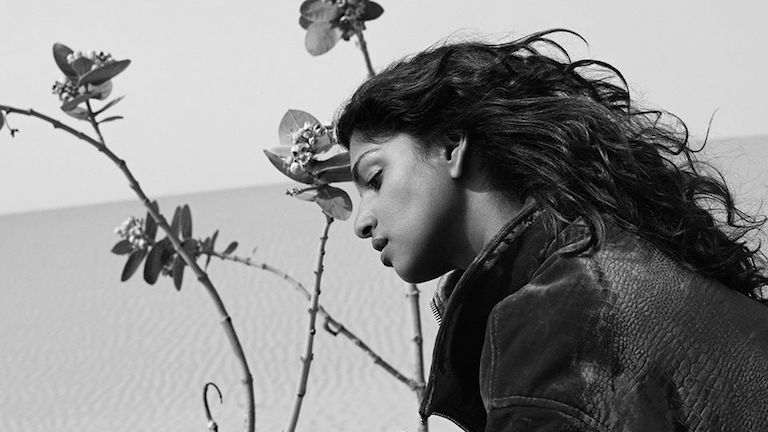M.I.A. Interview: Outsider Feminism, Social Media and Political Responsibility
September 16th 2016
Tanya Bonnie Rae

M.I.A.’s fifth album, AIM is out now via Interscope and Polydor Records
- M.I.A. :: Interview with Tanya Bonnie Rae
“I think it’s great that the newer generations are becoming more conscious and aware and political and opinionated. All of those things I feel like I’m a part of, and they’re a part of me.”
Mathangi “Maya” Arulpragasam is the Sri Lankan-raised, now UK-based rapper, singer, director, activist, designer and photographer known as M.I.A. On the eve of releasing her fifth and apparently final album AIM, Maya spoke to FBi’s Tanya Bonnie Rae. The international queen of controversy shared her thoughts on how pop music has changed since she’s been involved in the industry.
“I think there are a lot of closed doors now, where you can’t come into the music industry if you’re from a different class, or a different background, or a different political idea.”
Elaborating on where she sees herself within the spectrum of pop music, she said:
“I don’t know how I did it, but I sort of got through the net. I have such a big mouth that when I want the space, I fight for it, and when I don’t, I walk away. But a lot of kids are not like that. And I think sometimes they get scared or they can get tricked into selling out quicker than they’ve established who they are and their strengths. I think that’s why some of them don’t survive long.”
Maya arrived in London as a refugee in the mid 1980s, a survivor of the genocide that killed hundreds of thousands of Tamils in Sri Lanka. She is now the only artist in history who has been nominated for an Academy Award, Grammy Award, Brit Award, Mercury Prize and Alternative Turner Prize. She’s also a visual artist (Jude Law was one of the early buyers of her work) and a single mother with a 7-year-old son.
Talking about feminism in the age of social media, Maya is wary of the power that online platforms hold. Her views stem from personal experiences:
“When you talk about feminism – there are very clear issues that I’ve been through that could have really done with a hand from feminists, you know, fighting in my corner. But they don’t, and it doesn’t apply to me. For example, when I was going through a custody battle in the US courts, and the US laws are not often in favour of the mother. That’s where feminism needs to really change things in America, and not worry too much about whether a girl in India gets to wear a short dress or not.”
“On social media, the view of feminism is like, ‘Oh yeah, we’re liberating women in the Middle East from wearing burqas and stopping Indian women getting raped, and we’ve done that with a hashtag – we’ve all achieved it. That’s the perception on social media. So I feel like I’m stuck in this environment as an artist, where on the one hand I know that a hashtag doesn’t fully change anything… but I can’t criticise anything in the US because if I do, then my social media platform gets curbed.”
“If you’re talking about feminism within America, you’ll be promoted. But if you’re an outside feminist and you’re talking about something critical of the US law, then they would see that as a threat that needs to be buried.”
In November 2015, M.I.A. released the self-directed music video ‘Borders’, highlighting the ongoing refugee and migrant crisis. The track, along with the politically charged video, sparked international controversy amongst fans and critics.
Maya spoke about why she thinks it’s important for some artists to use their voice in order to spread awareness.
“To me, it’s important because I feel like I came out of that. I came out of a need to represent a bunch of people and speak for them, and to represent experiences and ideas that were not getting represented in the media. That’s always been the key to my work – if I didn’t do that, I just wouldn’t work.
“Recently, I went to make a piece of video art that was about me trying to be the pop star that everybody wanted me to be for all these years. I was like, ‘Okay, I’m finally going to make that video where I’m just going to be a pop bitch, and make that thing about nothing, you know?’ And it fell apart. And I think that was a clear sign to me that I can’t ever do that. Even if I try consciously, the universe doesn’t let me.
“I think other artists have a choice, they can be great entertainers and not be political – but even Michael Jackson was political. I think it’s nice if you’re praised and people listen to you, and suddenly you have all this power: you are moving things forward. But you have to move things forward for the politics.”
Before its release, M.I.A. announced that AIM would be her ‘last LP’. Is this really the case, and what does that mean for her future?
“As a complete album in the way albums are made on a major label? Yep, this is my last. I think I’d like to explore different formats. For now, I’m going to take some time out and explore other things, and then come back to it. Maybe by then, the format will change – because our distribution methods have changed and the technology has changed, and how you listen to it has changed. I don’t know if an album needs to look like an album anymore.”
Listen to the full interview above.
M.I.A.’s AIM is out now via Interscope and Polydor. It’s also our FBi Click album of the week.


